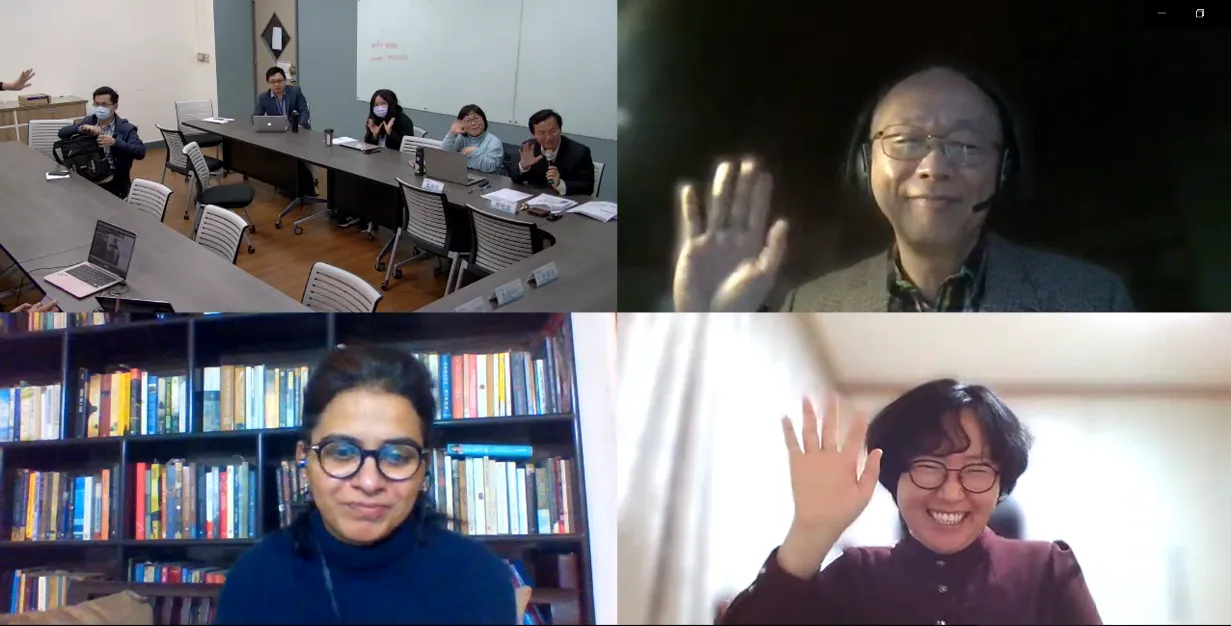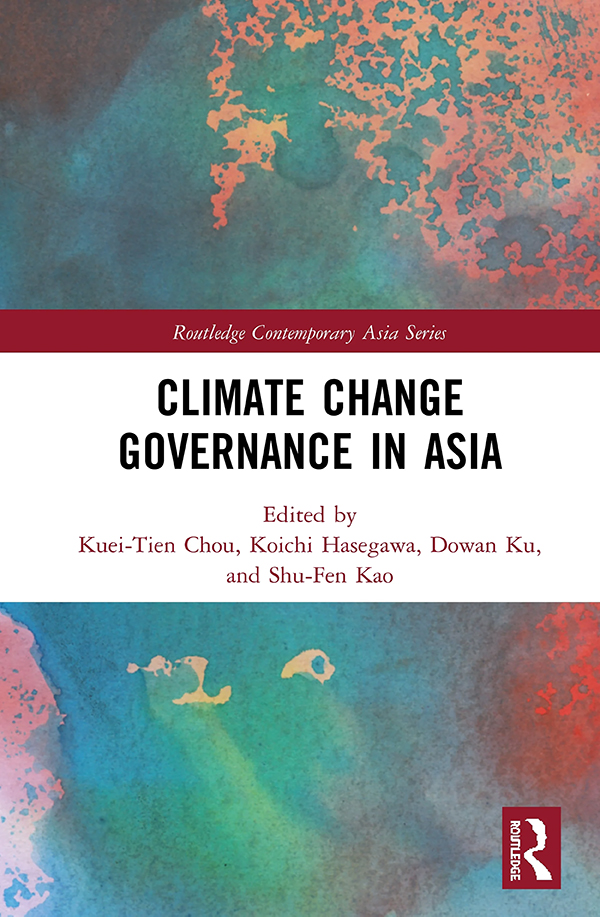
《亞洲氣候變遷治理》Climate Change Governance in Asia英文專書
Editor:Kuei-Tien Chou, Koichi Hasegawa, Dowan Ku, Shu-Fen Kao
Contributors:Leah Abayao, Midori Aoyagi, Chia-Wei Chao, Kang Chen, Roger S. Chen, Kuei-Tien Chou, Koichi Hasegawa, Shu-Fen Kao, Hajime Kimura, Dowan Ku, Ho-Ching Lee, Seejae Lee, So-Young Lee, Hwa Meei Liou, Alex Y. Lo, Anshu Ogra, Chaya Vaddhanaphuti, Sun-Jin Yun, Eric Zusman
亞洲國家如中國、印度、日本、南韓的碳排放量皆名列世界前十,南韓、日本、臺灣的人均碳排亦位居前列,是氣候變遷的最大貢獻者之一,但同時,亞洲諸國也是氣候變遷的受害者,如印度、臺灣、日本、菲律賓、泰國等,因氣候相關災害導致的經濟損失甚鉅。而亞洲各國雖發展程度不一,但其政治經濟體制普遍有從威權到民主化、強調發展主義、維持高碳經濟的特性,亦有多元的公民社會。本書含括了亞洲地區氣候變遷治理的多元性,呈現從都市到農村、從社區、地方、國家與社會關係以及國際關係等視角,既是亞洲國家治理研究,也是全球應對氣候變遷挑戰的案例研究。
本書主編為台大風險中心總計畫主持人周桂田教授、日本東北大學長谷川公一教授、南韓首爾環境與社會研究所具度完所長與佛光大學高淑芬教授,邀請亞洲各國十數位專家學者共同撰寫,由Routledge同步發行電子書與實體書。
相關連結:
【Book Launch Webinar】Climate Change Governance in Asia
- 導讀評析
- Book Launch Webinar
- Editors
- Contributors
- Contents
- 新書座談會
文/陳米蘭 博士後研究員
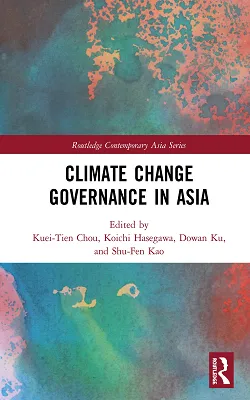
有鑒於氣候因素影響全球生態越加顯著,氣候變遷已成為政策制定上的重要議程,許多亞洲國家在近幾年也針對氣候變遷進行系統性的調適和減緩。由周桂田(Kuei-Tien Chou)教授、長谷川公一(Koichi Hasegawa)教授、具度完(Dowan Ku)教授、高淑芬教授(Shu-Fen Kao)所編著的《亞洲氣候變遷治理》(Climate Change Governance in Asia)補足了目前既有文獻對亞洲國家的氣候變遷治理的研究,提供了不同東亞政府與社會在面對風險災害的治理脈絡。
此書最主要的貢獻,是嘗試聚焦亞洲國家在高度發展導向中所建構的減碳架構。亞洲國家,尤其是台灣、日本、和南韓在戰後大部分以發展導向為標竿,並倚賴高度排放二氧化碳的社會和經濟模式以達到預定的經濟目標。除了這些東亞發展導向國家,本書也收錄了中國、菲律賓、泰國、印度等案例,以了解政府、社會、人民如何面對和關注氣候變遷議題為主旨,並探討氣候變遷議題設定的過程和層次,檢視這些不同的氣候變遷治理模式。除了國家層級,地方城市和社區層級在應對氣候變遷災難時所建構的調適網絡也在此書有深度的介紹與討論。總體來說,本書為想了解亞洲國家在氣候變遷治理的讀者提供了一個重要的架構,也為全球氣候變遷治理的研究提供關鍵區域模式的詳細討論。
本書包含了十三個章節並涵蓋了三大部分。第一部分 Framework of Climate Change Governance in Asian Countries(第二到四章)是探討亞洲國家氣候變遷治理的架構、第二部分 Risks and Transition(第五到九章)是跨國和地方上的風險和轉型比較、第三部分 Local Governance on Climate Change Adaptation(第十到十三章)則聚焦於地方氣候變遷調適的治理。作者群在第一章揭幕了本書的編撰初衷與目的,並強調亞洲國家經驗在全球氣候變遷治理的重要和特殊性。這個章節中羅列了研究背景和架構,也介紹了三個採用的研究途徑,分別為:用比較政治方法來分析不同政府和社會在應對氣候風險所採取的政策制定手段和過程;用全球治理框架、系統和規範來檢視不同國家的治理模式;藉由各國不同的模式來了解氣候變遷治理效益和其社會影響;檢視非政府組織在各國氣候變遷治理的網絡和行動。
在第一部分亞洲國家氣候變遷治理的架構中,作者們分別就東亞的三個國家,日本、台灣、南韓耙梳了不同的減碳政策制定過程。Koichi Hasegawa檢視了日本的國家自主貢獻(National Determined Contributions, NDCs)和能源政策,並指出日本因為政治體制的因素並沒有針對氣候變遷有全面性的回應,這也使得即使在2011年福島事件後日本在能源轉型和氣候政策仍然窒礙難行。Kuei-Tien Chou和Hwa-Meei Liuo則探究台灣,一個高碳排社會在面對轉型所會遇到的經濟、政治和制度上的困難和挑戰。為了能應對氣候變遷所帶來的變革,Chou和Liou指出台灣必須重新定義永續的概念,並進行典範的轉移(paradigm shift)。這包括產業、社會、能源、環境、甚至勞力市場等都需在減碳上進行系統性改革和落實。Sun-Jin Yun則聚焦南韓在制定國家自主貢獻的過程中,遇到參與制定的團體不夠多元,並往往被高碳排企業把持話語權。因此整體社會的討論和對話在減碳目標制定過程中是較為缺乏的。總觀來說,這三個國家雖然根據氣候變遷綱要公約和巴黎協定制定減碳政策,但並沒有對其所仰賴的高碳排經濟體制做出系統上的改變。這些國家仍舊依循依賴路徑並把自身經濟體鎖定在褐色經濟,可以預期轉型的過程中將遇到許多挑戰。
此書的第二部分,風險與轉型,分別就風險認知和環境論述等議題,分別整理中國、泰國、日本、台灣、韓國在氣候變遷、再生能源政策氣候風險的討論。Kang Chen和Alex Y. Lo在第五章則討論了廣東的碳交易計畫建構下,國際組織和本地機構的合作和治理,點出中國政府在氣候治理態度和手段的轉變。在第六章Chaya Vaddhanaphuti則檢視不同的國際氣候組織在泰國北方的Nan省(Nan Province)因應氣候變遷所採取和提供的調適手段。在第七章Midori Aoyagi採取比較歐洲國家的風險認知來探討在日本社會對氣候和能源的討論。其指出日本政府雖然做了許多有關氣候風險的公眾宣傳、也成功地提高了民眾對氣候變遷的認知,但卻無法在氣候議題與能源議題作出有效的連結。作者呼籲大眾媒體和政府宣傳將是影響巴黎協定有效落實的關鍵。Chia-Wei Chao和Kuei-Tien Chou則在第八章引用系統風險的架構來討論氣候變遷在台灣的影響,兩位作者指出因為缺乏相應的治理架構,公眾對氣候災害的認知目前無法有效轉化為實質的治理策略,更提出了一系列的改善方式和建議。在第九章Hajime Kimura以碳捕捉技術(carbon capture storage, CCS)作為主軸,討論大眾和非政府組織如何理解和回應碳捕捉技術。Kimura用生態現代化(Eecological modernization)的角度檢視不同社會體對於碳捕捉技術的反應,並供政府和企業在制定減碳科技政策時更能實際地面對社會反應。本書在氣候風險認知和論述主題下提供了五個亞洲國家和地方的案例,雖然無法系統性的比較這些不同的認知和成因,但仍有助讀者更深一步的了解大眾風險認知和氣候治理的關聯。
本書第三部分較聚焦於地方層級的氣候調適,包括如都市永續、災害管理、社群網絡等討論。首先在第十章,So-Young Lee、Eric Zusman和Seejae Lee檢視首爾政府在永續轉型和綠色成長(Green Growth)所做的改革和推動成因。作者們指出在治理過程中協同作用(synergies)包含不同治理層次和行為者)最強的地方是成功地創造了可以多方參與的平台,並可預期達到深遠的變革。Anshu Ogra在第十一章探究印度的氣候變遷調適政策,其指出印度的四大省份已經可以測量出氣候變遷所帶來的升溫和降水的減少,咖啡農業的影響尤為顯著。印度政府如何運用在地知識並調適趨於極端的氣候將是迫切的課題。第十二章Leah Abayao討論菲律賓災害減緩和管理(Disaster Risk Reduction and Management)在北部社區針對降雨災害的應用和治理。Abayao藉由這個案例說明與地方的溝通平台和合作地知識產出是降低風險災害的關鍵。接續氣候調適的地方合作脈絡,Roger S. Chen和Ho-Ching Lee採用社群網路分析(social network analysis)和文字探勘(text mining)了解台南在2011到2015年有關水災的韌性建構。作者指出台南縣在災害治理雖然健全,但缺乏跨部門的協調,地方鄉里長應該扮演社區在應對自然災害時的重要樞紐。經由這十到十五章跨國案例的比較,讀者可以了解到,在氣候變遷調適中地方知識和能力的建構是非常關鍵的角色,如何在氣候治理時加強與整合地方知識社群,將是調適政策制定的重要方向。
總結來說,本書提供了亞洲國家在氣候治理上非常有趣的案例和實踐,藉由這些不同國家和社區的比較,可以勾勒出在面對氣候變遷時一些重要的政策方向和治理方針。雖然本書無法完整提出亞洲或是高碳排東亞國家系統性的氣候治理架構比較有些可惜,但就算不是具有專業背景的讀者也可以從不同章節了解到亞洲各國氣候政策和其背後政治社會成因。
Asian countries are among the largest contributors to climate change. China, India, Japan and South Korea are among the top ten largest carbon emitters in the world, with South Korea, Japan and Taiwan also some of the largest on a per capita basis. At the same time, many Asian countries, notably India, Taiwan, Japan, the Philippines and Thailand are among those most affected by climate change, in terms of economic losses attributed to climate-related disasters.
Asia is an extremely diverse region, in terms of the political regimes of its constituent countries, and of their level of development and the nature of their civil societies. As such, its countries are producing a wide range of governance approaches to climate change. Covering the diversity of climate change governance in Asia, this book presents cosmopolitan governance from the perspective of urban and rural communities, local and central governments, state-society relations and international relations. In doing so it offers both a valuable overview of individual Asian countries’ approaches to climate change governance, and a series of case studies for finding solutions to climate change challenges.
Kuei-Tien Chou is Professor at the Graduate Institute of National Development, National Taiwan University and Lead Principal Investigator of Risk Society and Policy Research Center, National Taiwan University.
Koichi Hasegawa is Professor of Sociology at Graduate School of Arts and Letters, Tohoku University, Japan.
Dowan Ku is Director of Environment and Society Research Institute, Seoul, South Korea.
Shu-Fen Kao is Associate Professor at the Department of Sociology, Fo Guang University, Taiwan.
Leah Abayao is Professor of History and former Director of Cordillera Studies Center at the University of the Philippines, Baguio.
Midori Aoyagi is Principle Researcher at the Center for Social & Environmental Systems Research, National Institute for Environmental Studies, Japan.
Chia-Wei Chao is Postdoctoral Fellow at the Risk Society and Policy Research Center, College of Social Science, National Taiwan University.
Kang Chen is PhD graduate of the Department of Geography, the University of Hong Kong.
Roger S. Chen is Associate Professor at the Graduate Institute of Construction Engineering and Management, National Central University, Taiwan.
Kuei-Tien Chou is Professor at the Graduate Institute of National Development, National Taiwan University and Lead Principal Investigator of Risk Society and Policy Research Center, National Taiwan University.
Koichi Hasegawa is Professor of Sociology at the Graduate School of Arts and Letters, Tohoku University, Japan.
Shu-Fen Kao is Associate Professor at the Department of Sociology and Social Work, Fo Guang University, Taiwan.
Hajime Kimura already has a PhD in Science, Waseda University in Tokyo, and now he is studying for his PhD in Sociology, Meiji University, Japan.
Dowan Ku is Director of the Environment and Society Research Institute,
Seoul, South Korea.
Ho-Ching Lee is Professor at the Center for General Education, National Central University. Taiwan
Seejae Lee is Professor Emeritus at the Catholic University of Korea.
So-Young Lee is Senior Policy Researcher and Research Manager at the Sustainability Governance Centre, Institute for Global Environmental Strategies, Japan.
Hwa Meei Liou is Professor at the Graduate Institute of Technology Management, National Taiwan University of Science & Technology.
Alex Y. Lo is Senior Lecturer in Climate Change at the School of Geography, Environment and Earth Sciences, Victoria University of Wellington, New Zealand.
Anshu Ogra is a Post-Doctoral Research Associate in the Landslip Project at the Department of Geography, King’s College London.
Chaya Vaddhanaphuti is Lecturer in the Department of Geography, Faculty of Social Sciences, Chiang Mai University, Thailand.
Sun-Jin Yun is Professor of Environmental and Energy Policy at the Graduate School of Environmental Studies, Seoul National University.
Eric Zusman is Senior Policy Researcher/Area Leader at the Institute for Global Environmental Strategies, Japan.
- Introduction
Part I. Framework of Climate Change Governance in Asian Countries
- Koichi Hasegawa
Climate Change Governance in Japan: Critical Review on Japan's INDC and its Energy Policy
- Kuei-Tien Chou and Hwa Meei Liou
Climate Change Governance in Taiwan: The Transitional Gridlock by a High Carbon Regime
- Sun-Jin Yun
Climate Change Governance in Korea: Focusing on the Process of the Establishment of its NDC
- Kang Chen and Alex Y Lo
Climate Governance in China: the role of International Organisations in the Guangdong Emission Trading Scheme
Part II. Risks and Transition
- Chaya Vaddhanaphuti
Governing Climate Knowledges: what can Thailand Climate Change Master Plan and climate project managers learn from lay Northern Thai villagers?
- Midori Aoyagi
Risk Perceptions and Attitudes Toward National Energy Choices and Climate Change in Japan and European Countries
- Chia-Wei Chao and Kuei-Tien Chou
Governing the Climate-Driven Systemic Risk in Taiwan – Challenges and Perspectives
- Hajime Kimura
Ecological Modernization, New Technologies and Framing in the Environmental Movement: A climate Change Mitigation Technology (CO2 capture and storage) and its Environmental Risk
Part III. Local Governance on Climate Change Adaptation
- So-Young Lee, Eric Zusman and Seejae Lee
Tracing Sustainability Transitions in Seoul Governance: Enabling and Scaling Grassroots Innovations
- Anshu Ogra
Rethinking Adaptation to Climate Change in the Policy Landscape of India
- Leah Abayao
Disaster Risk Governance in Northern Philippines Communities: Issues and Prospects in Climate Change Talks
- Roger S. Chen and Ho-Ching Lee
Assessing Climate Governance of Tainan City through Stakeholder Networks and Text Mining
文/許令儒 攝影/鄞義林
11月29日《亞洲氣候變遷治理》新書座談於2020年臺灣社會學年會舉行,在台大社會系的活動現場由本中心主任周桂田教授擔任主持人,佛光大學高淑芬教授為與談人,更特別邀請到日本東北大學長谷川公一教授、韓國首爾大學尹順真教授、英國倫敦國王學院Anshu Ogra博士等作者群透過線上視訊共同與談,討論本書內容外也分享東亞各國最新減碳進程。
本書由周桂田、長谷川公一、具度完、高淑芬等四人主編,並有來自臺灣、日本、韓國、泰國、菲律賓、印度、香港的學者參與撰寫。詳請請參考本書介紹頁。
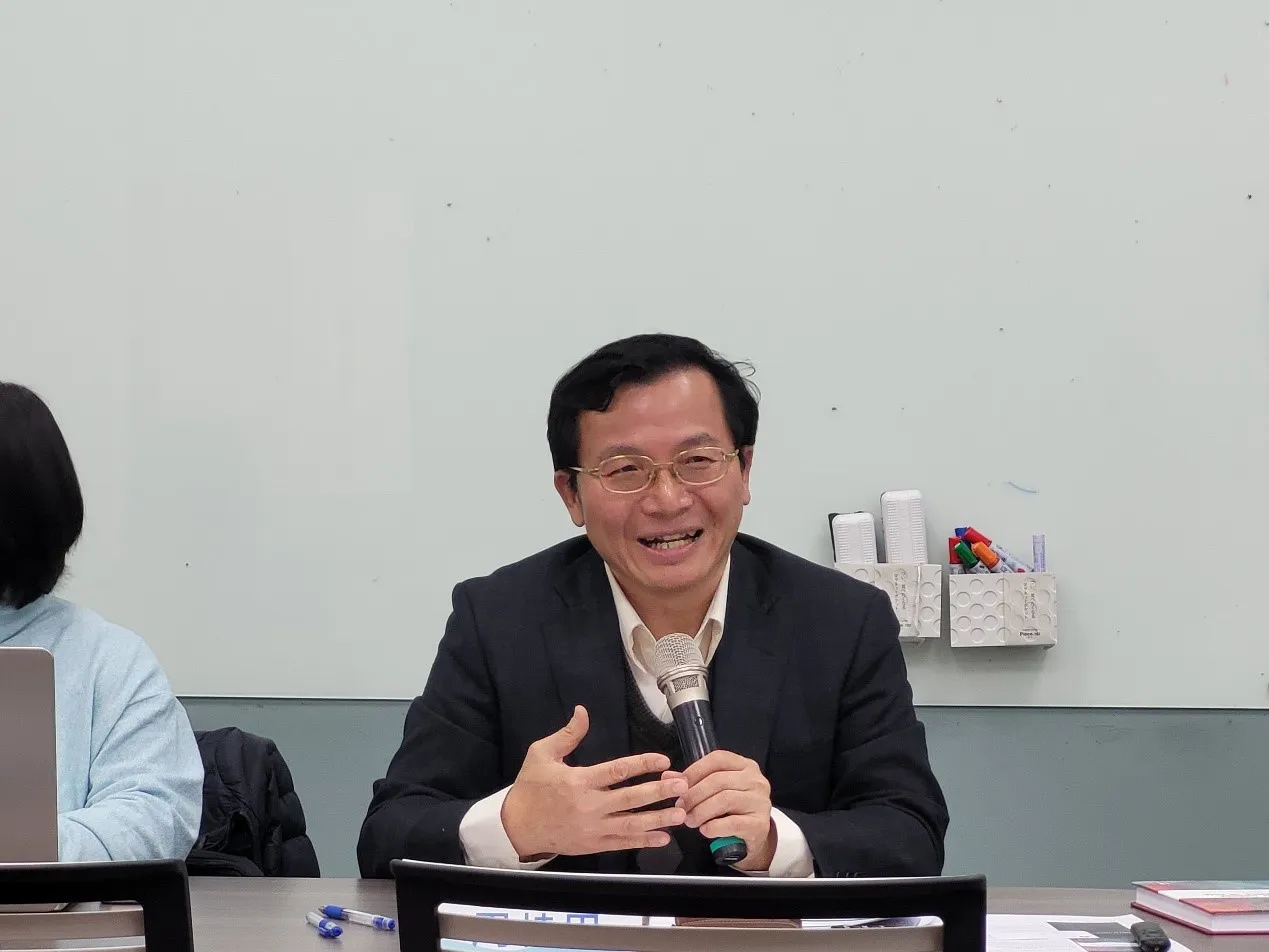
周桂田開場介紹編輯本書目的。
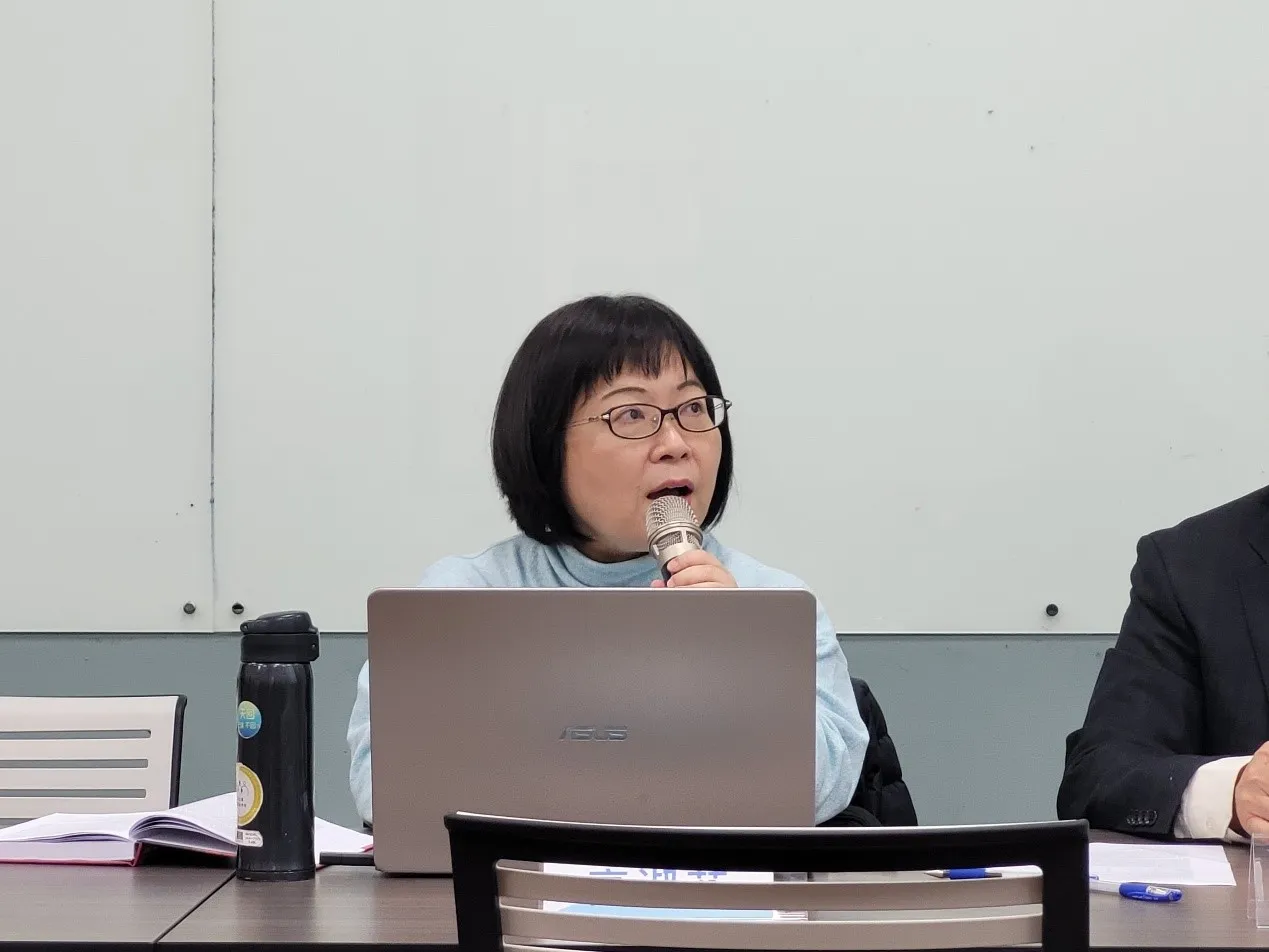
高淑芬概述了本書架構與章節。
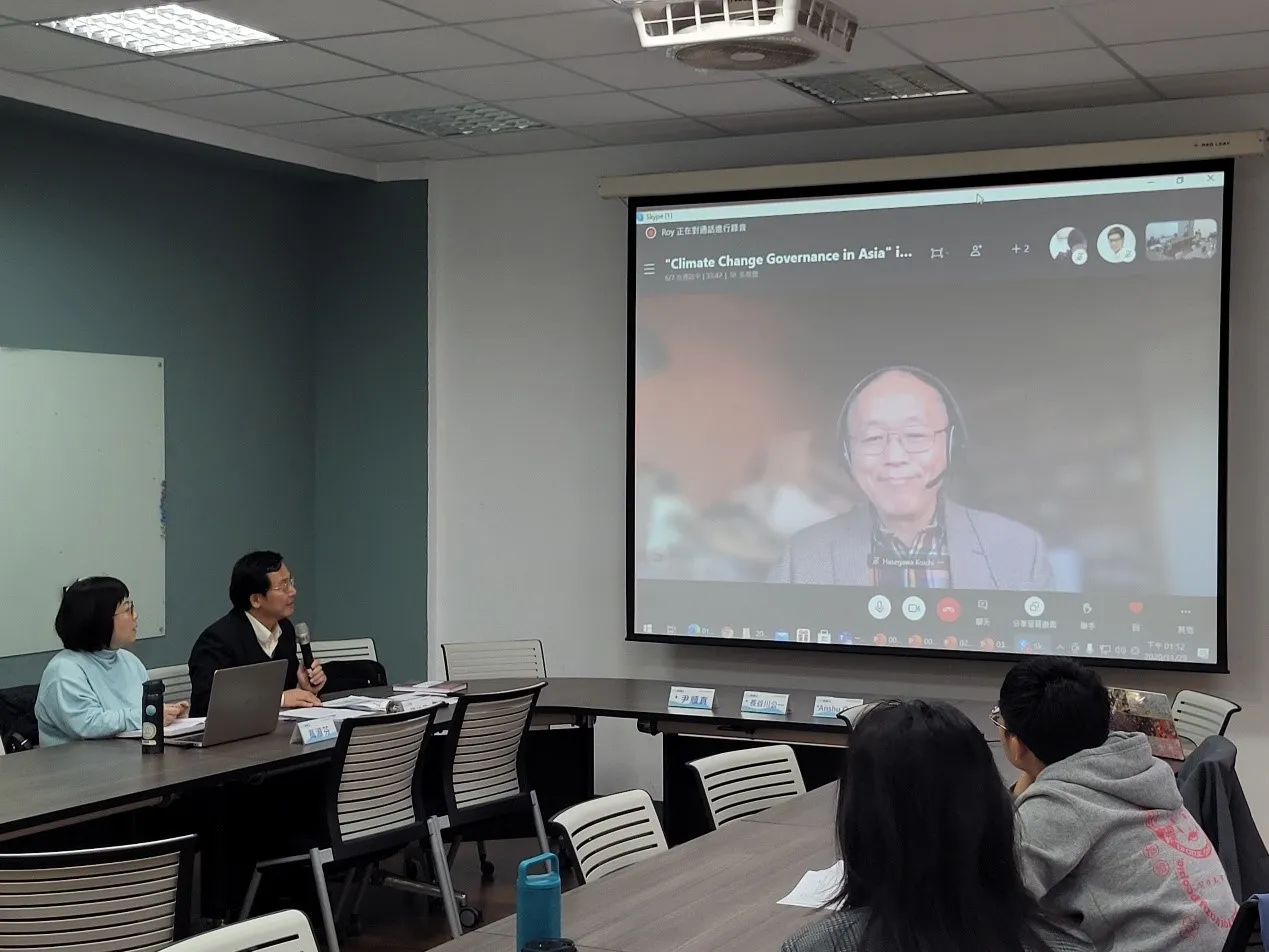
長谷川公一簡報其專章「Climate Change Governance in Japan: Critical Review on Japan's INDC and its Energy Policy」。
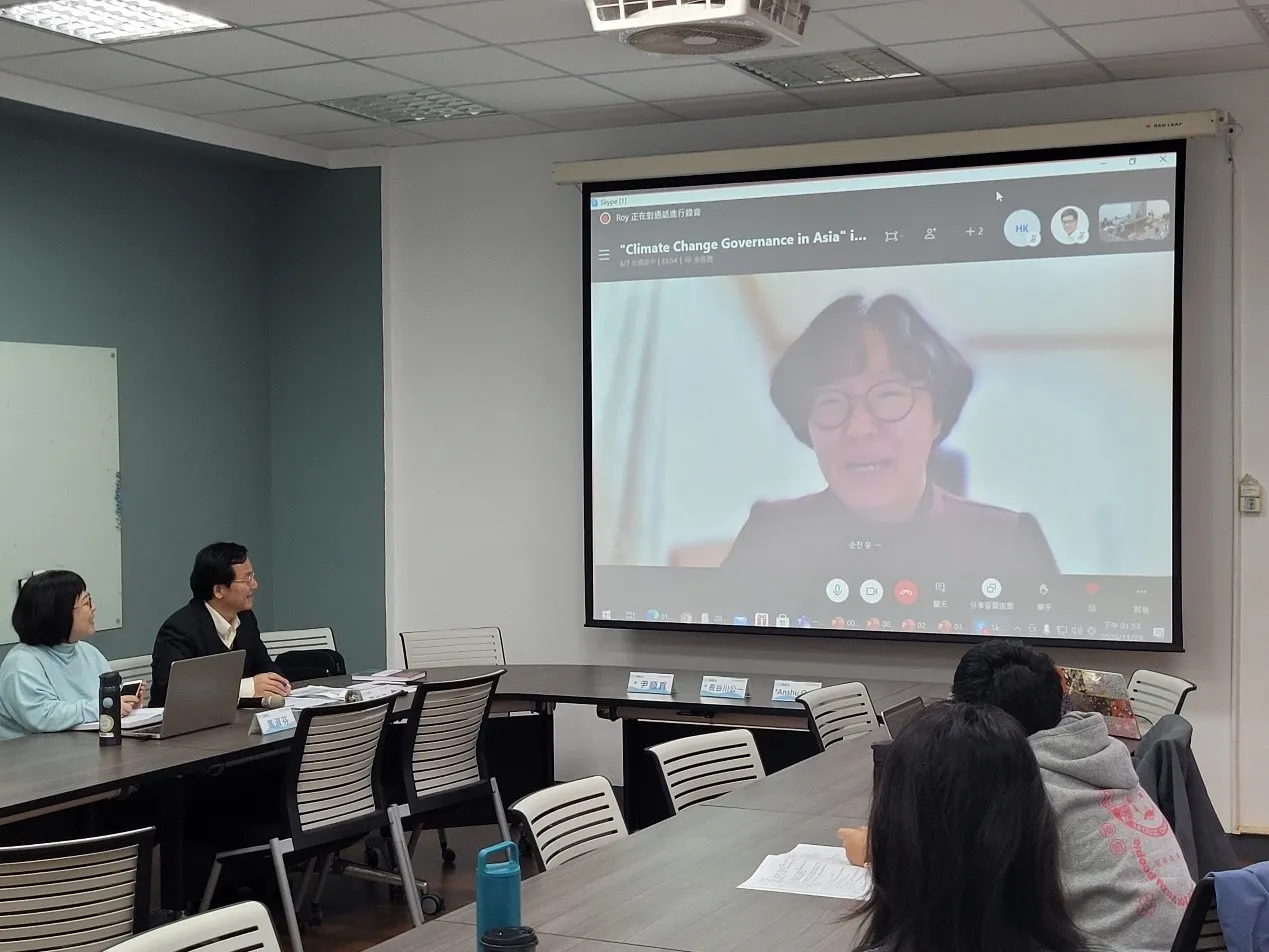
尹順真分享她的最新研究「Korea's Green New Deal & Net Zero 2050 Pledge: Why and How」。
Ogra博士簡報她的專章「Rethinking Adaptation to Climate Change for the Policy Landscape of India」。
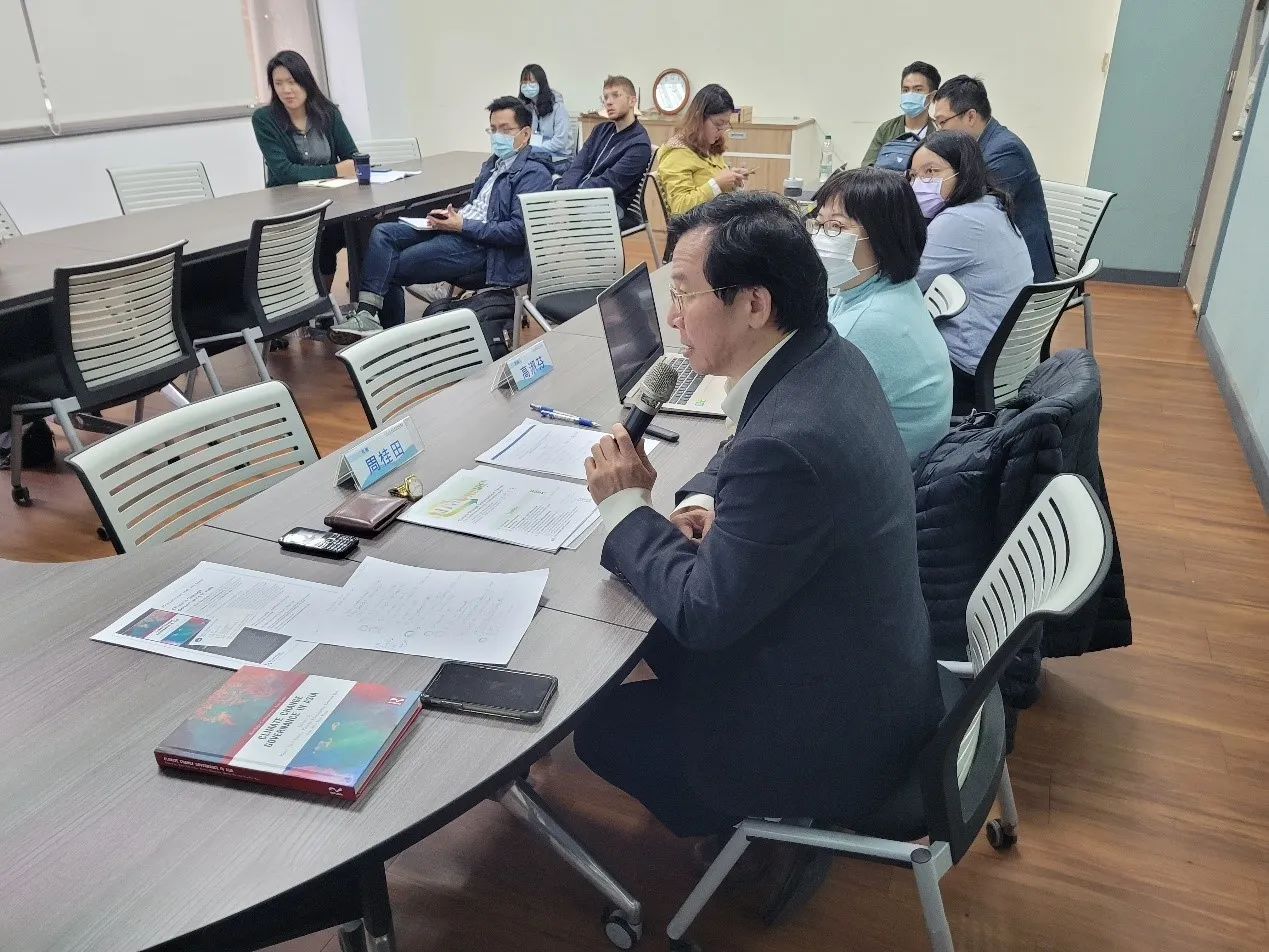
Korea's Green New Deal & Net Zero 2050 Pledge: Why and How by Prof Yun, Sun-Jin (TSA 1/4)
Climate Change Governance in Japan by Prof Hasegawa, Koichi (TSA 2/4)
Climate Change Governance in Taiwan by Prof Chou, Kuei-Tien (TSA 3/4)
Rethinking Adaptation to Climate Change for the Policy Landscape of India by Dr Anshu Ogra (TSA 4/4)

本著作係採用創用 CC 姓名標示-非商業性-禁止改作 4.0 台灣 授權條款授權.
本文歡迎媒體及相關平台轉載,惟請遵守引用原則:
1.姓名標示 2.非商業性 3.禁止改作。註明文章來源轉載自台大風險中心,以及附上資料來源並連結本文。
若僅引用部分資料和數據,務必在上架前與我們確認相關內容,若有採訪需求或其他合作事宜,請與我們聯繫。
※商業用途轉載,請與本中心連絡,謝謝。※

